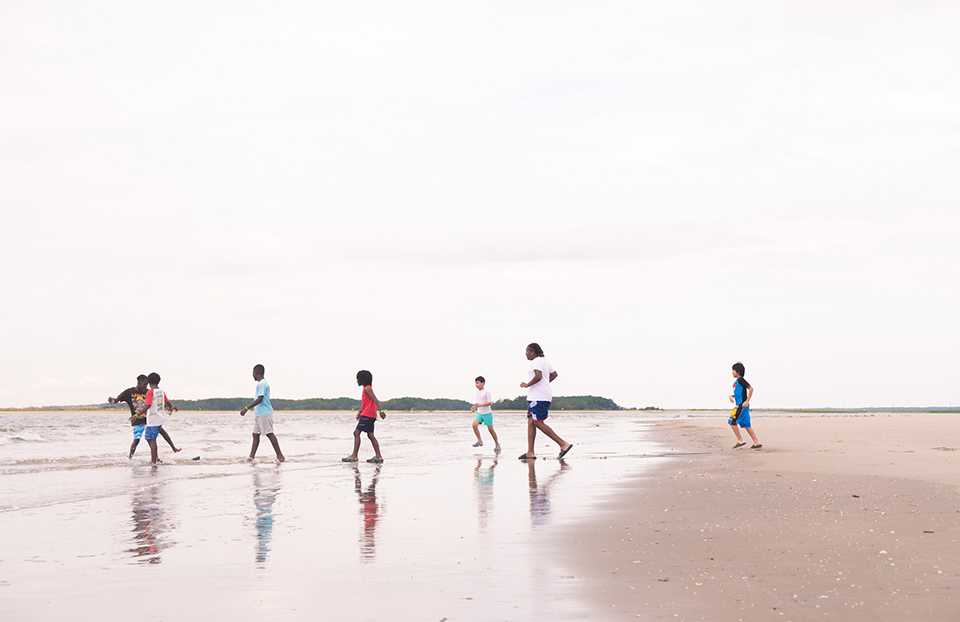Society Fellow Richard Fox Teaches Forensics to Students and Connects the Community
Richard Fox, a 2010 Society Fellow, is a forensic science teacher at Charlestown High School in Boston, Massachusetts. Below he describes his collaborations with the Boston-area community and the impact participating in research has on students.
What is your background in science and research, including what first drew you to science?
Actually, I was a terrible student in high school. I was very bored and disinterested and had trouble making connections between school and the real world. An introductory ecology class in college sparked my interest and I decided to be a science major. While in college, I worked a crazy job as a zoologist at Busch Gardens in Tampa where I used to do everything from pulling blood samples of African wildlife to roping ostriches! In the last twenty years I have had the opportunity to be trained at some of the finest scientific facilities in the country, including the Human Remains I.D Lab, Oak Ridge National Labs, the Human Genome Project, and the McCrone School of Microscopy.
How has being a Society Fellow impacted your ability to develop a research program?
Being a Society Fellow has provided me with the opportunity to purchase much needed data gathering equipment that our students did not previously have access to. It also exposed me to the Intel International Science and Engineering Fair , which is sort of the “Olympics” of science fairs. It is quite an amazing event.
Can you describe the progress you have made at your school and in your community?
Boston has a very checkered past of racial division. Some of the scars from the forced bussing of the 1970’s still run very deep. Most of my students come from the city, where the police are often viewed as corrupt or suspicious. Since the development of the forensic program at Charlestown High School many of my students have expressed an interest in law enforcement careers. Collaboration with the Boston Police Department and other forensic facilities has brought together students and professionals from what was often considered “different worlds.”
You are collaborating with professionals to build a forensic facility in Boston that will be used to train high school students in forensic and biotechnology laboratory techniques. Can you describe what has happened with that project and how you were able to develop this collaboration?
Boston is a research town. Over the last couple of years we have received equipment donations worth vast sums of money. The idea was to develop an on-site laboratory that could be used to train students to fill a huge shortage of knowledge workers. Charlestown High School is currently undergoing a major renovation that will take 2 1/2 years. Since the plans for the lab will be frozen for at least that long, colleagues from Massachusetts General Hospital and I are looking at another location.
You have also recently begun hosting biotech and forensic lab workshops for younger students. Can you tell us about that?
There is nothing more exciting than watching my older students work with younger students. This year we ran a month long weekend forensic workshop for middle school students at Emmanuelle College. We also sponsored a silent auction for a “CSI” birthday party. The 4th graders that won the auction came to my lab where we took fingerprints from balloons, dental impressions from the cake, and used a thermo probe to record the temperature of the birthday candles before the kids blew them out.
What advice would you have for other individuals attempting to increase interest in science in their communities and nurture students through the research process?
Remember that there is always opportunity to collaborate with the community. I came from Las Vegas where there was very little interest in education. I began to reach out to everyone from casinos to the Las Vegas Police Department. You would be surprised how much support there is when folks know you are working to help kids.
Why do you think it’s important for students to participate in scientific research?
Research helps with the understanding of basic scientific principles. With an ever increasing technical and complex world our students need to be more scientifically literate than ever before. It may sound cliché but I believe it is a foundation of a strong democracy.
What are your future plans?
I am approaching the mid point of my career and I am interested in taking things to another level. I would like to create something very unique. The community lab would fit that bill. I could train some younger teachers how to teach basic forensics, teach a couple of advanced forensic courses, and arrange internships for the high school students. That would be my dream job.
Final thoughts?
I have been doing forensics for a long time and I am always interested in helping people get their programs started even if they are only interested in integrating a forensic component into existing curriculum. Feel free to reach out!


